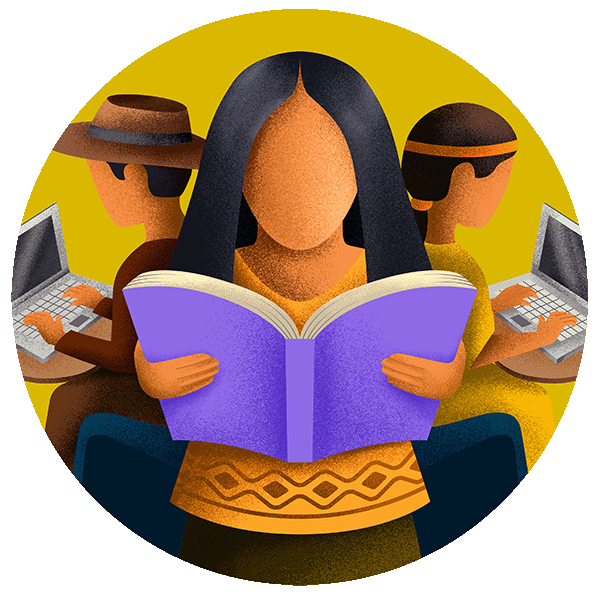
Language Revival Initiatives In Asia
Of the estimated 7,000 known languages globally, 32 percent of them, which means as many as 2,300 languages are spoken by Indigenous Peoples living in Asia. But lately, because of many reasons, Indigenous languages are disappearing at an alarming rate globally.
Education In Nigeria
In this report from Positive FM 102.5 FM in Akure Nigeria, the producers went to the streets to talk to the people about the state of education in Nigeria.
Produced by Positive FM in Nigeria.
International Day For People Of African Descent 2022
Hundreds of millions of people in the Americas alone identify as being of African descent. Whether descendants of transatlantic slaves or immigrants, they are among the poorest and most marginalized, in some cases. Nevertheless, people of African descent possess a great multicultural richness, and resilience and significantly contribute to every facet of life.
Produced by Shaldon Ferris (Khoisan)
Music: "Anania2, by The Baba Project, used with permission.
"Burn your village to the ground", by The Halluci Nation, used with permission.
Produced by Shaldon Ferris (Khoisan)
An Update On The Struggle Of Indigenous Fisher Folk In South Africa (Afrikaans Language)
In this interview, John Cloete from Radio West Coast interviews Naomi Cloete, a small-scale fisher from Paternoster, and they talk about the reality of the poverty that fishermen live in, they talk also about how generation after generation of fisher-boys become fishermen because there simply is no other life for them on these shores. Naomi also tells us how fisher folk has to suffer, partly because of policy but more worryingly by the national silence that shrouds the Indigenous Peoples of the Western cape coastlines.
Radio Is A Powerful Tool That Protects Indigenous Knowledge
Khwedam Radio in Namibia was started in 2019 with support from Cultural Survival as an internet radio station.
In this radio program, we hear about the progress of the station, as well as some of the challenges experienced by the management of the station.
Produced by Shaldon Ferris (Khoisan)
Interview by Khwedam Radio
"Anania2" by The Baba Project, used with permission
"Burn your village to the ground", by The Halluci Nation, used with permission.
States Must Commit To Reduce Emissions - Victoria Buschman At COP26
António Guterres, the Secretary-General of the United Nations, in a statement on the conclusion of COP26, said the conference outcome reflected the state of political will in the world today and provided building blocks for progress. “We are in the fight of our lives, and this fight must be won,” he said. “Never give up. Never retreat. Keep pushing forward.”
Dawn Baum And Javier Kinney On Climate Change
“The outcome of COP26 is a compromise. It reflects the interests, the contradictions, and the state of political will in the world today. It is an important step, but it is not enough,” UN Secretary-General António Guterres said at the conclusion of the conference. Indigenous Peoples from all over the world attended COP26 in Glasgow, Scotland. This year, Indigenous Peoples represented the second-largest civil society delegation in attendance at COP26, second only to oil and gas lobbyists.
Indigenous Peoples Speak With One Voice - Graeme Reed At COP26
The International Indigenous Peoples Forum on Climate Change (IIPFCC) was established in 2008, as the Caucus for Indigenous Peoples participating in the United Nations Framework Convention on Climate Change (UNFCCC) processes. The IIPFCC represents the Indigenous Caucus members who are present/attending the official UNFCCC COPs and intersessional meetings of the Subsidiary Body for Scientific and Technological Advice (SBSTA/SBI) bodies in between COPs. Its mandate is to come into agreement specifically on what Indigenous Peoples will be negotiating for in specific UNFCCC processes.
Wildfires Have Burnt Our Ancestral Lands - Thomas Joseph At COP26
The emissions that cause climate change come from every part of the world and affect everyone, but some countries produce much more than others. The 100 least-emitting countries generate 3 percent of total emissions. The 10 countries with the largest emissions contribute 68 percent. Everyone must take climate action, but people and countries creating more of the problem have a greater responsibility to act first.
Climate Change Also Impacts Our Ceremonies - Ozawa Bineshi Albert At COP26
Climate change can affect our health, ability to grow food, housing, safety, and work. Some of us are already more vulnerable to climate impacts, such as people living in small island nations and other developing countries. Conditions like sea-level rise and saltwater intrusion have advanced to the point where whole communities have had to relocate, and protracted droughts are putting people at risk of famine. In the future, the number of “climate refugees” is expected to rise.
